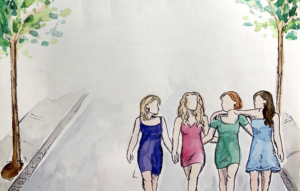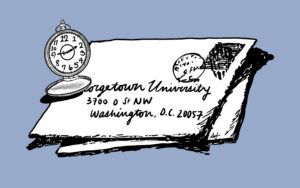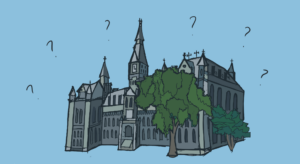It was spring break of senior year when I stepped off of a plane in Rwanda on a trip with Georgetown. A few days earlier, I had been at the university’s Career Education Center, frantically looking at different job opportunities. There, I heard many people nervously wondering whether they would make it to the next round of interviews. In Africa, I began to realize that the life we see on campus, replete with parties, brand name internships, and high-achieving students, was just a fraction of the life that is out there. The collegiate atmosphere alone should not limit us in the decisions we make. When I visited many towns in Rwanda that were recovering from the 1994 genocide, I learned the importance of interpersonal skills and emotional growth. These are things I seldom learned in a classroom; rather I picked them up with friends, while exploring places I had never seen before.
I remember the times when my friends and I would ride the Washington Metro and choose the farthest places to go. It was during these adventures when my education felt real, as I wasn’t simply just studying for the sake of getting a good grade on an exam. Our forays were a kind of social classroom, where we learned to understand one another, who we wanted to be, and what impacted us the most. Even when we went to parties or formal events, it was not necessarily the music or club that made each moment amazing. Instead, it was the fact that we were all together. We reveled in the idea that we all were in the same phase of life and unsure of where our journeys would take us. What mattered in the end was that we knew how to figure out who we wanted to be through our different experiences, and what friendship meant to each of us. It’s this education that I’ll value most from my experience at Georgetown.
Africa made me realize that life cannot always be planned out exactly in advance—something many students I encounter at Georgetown seem to have down. In Rwanda, I visited a village that had a school devoted to teaching advanced science and mathematics to young girls, and I met a senior official of a major telephone company. I realized the one attribute that all these people had in common was the ability to think beyond their four walls and realize that there was something greater than themselves such as helping others. I am not referring to a higher being, but to ideas and concepts that can only be discovered through experience. It was one thing reading about politics in Africa on the Internet, but actually going to the continent made me think differently because all my senses were fully engaged.
As graduation approaches, my initial nervousness and anxiety is beginning to ease, because I know that the race to get jobs and win prestigious academic awards is just the part of life that I lead as a student, and is not as important as understanding the world and the people in it. It is amazing to think that the genocide in Rwanda was not stopped by academic work and management skills alone, but also by the ability of people to understand each other emotionally and personally.
When I exit the campus gates one last time, it will be my experiences with friends sitting outside discussing how we felt and my experiences in other parts of the world which will help me to make tough decisions as I decide my future.






